While a man was hiking a narrow, slick pathway on Lookout Mountain, in Phoenix, Arizona, he couldn’t imagine the surprise that he was about to encounter.
He was concentrating on his hike until he noticed a pair of amber eyes twinkling in a crevice in the side of the mountain.
The man was stunned when he realized that the sorrowful, piercing eyes belonged to a frightened and exhausted dog.
Her fur was the colour of dirt, and it completely blended in with the environment. If the pup didn’t have such striking eyes, the hiker would have walked past her without noticing her.
The doggo had no strength left in her malnourished body, and she was close to the point of giving up on herself.
Rescuing The Exhausted Pup

When the dog saw the hiker approaching her, she lifted her head and looked at him. Her heart began glimmering with hope that she could be saved after all.
After the man comforted the pup, he reached out to the Arizona Humane Society (AHS), asking them to help the doggo.
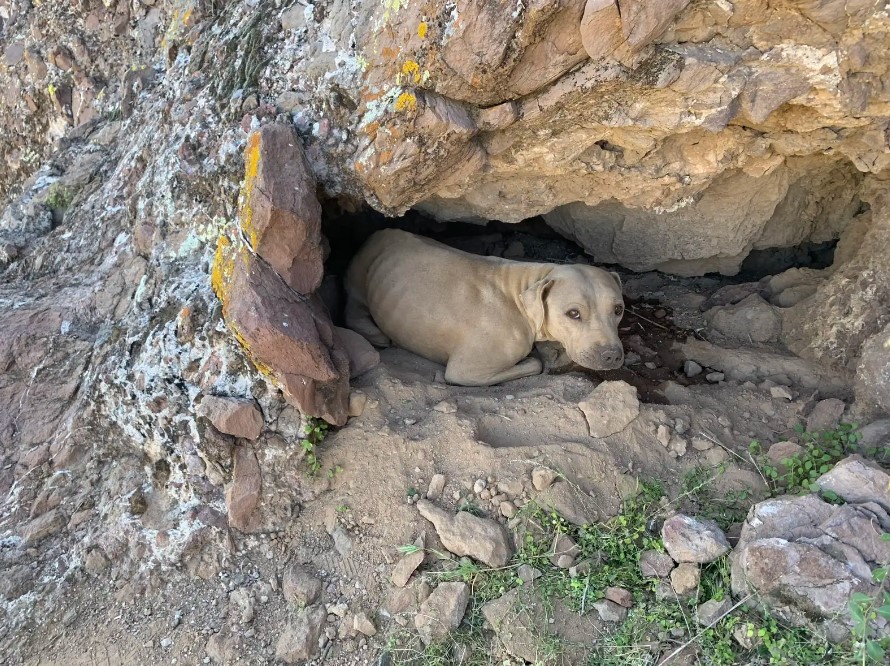
The AHS’s emergency animal medical technicians, Ruthie Jesus and Tracey Miiller, immediately headed to the scene.
The giant-hearted hiker stayed with the doggo, later named Bright Eyes, for almost two hours until the rescuers arrived at the location.
“… She blends in so much, the complainant told us that he wanted to call her Bright Eyes because when he hiked past her, that was literally the only thing he saw was her amber bright eyes staring back at him,” Jesus said in a video taken by the AHS after the rescue.
Although the doggo still felt scared, she let the good humans take care of her.
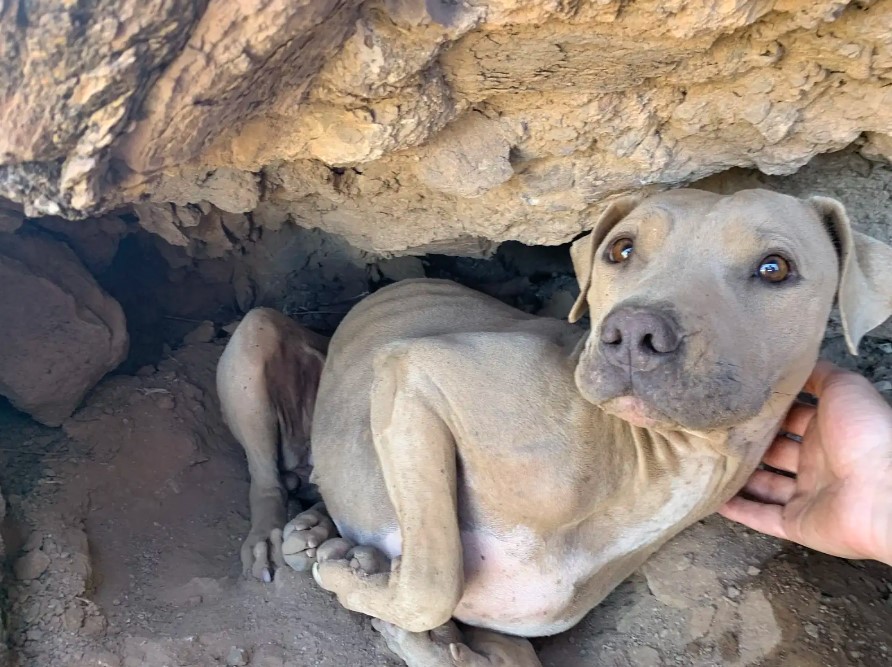
The medical technicians examined Bright Eyes. Apart from being severely dehydrated, the doggo had cuts on her paws and a wound on her rear end.
The rescue team could tell that she was a real sweetheart. Bright Eyes let them caress her head.
However, due to her fear, the doggo froze in the den, and the rescue team had to pull her out.
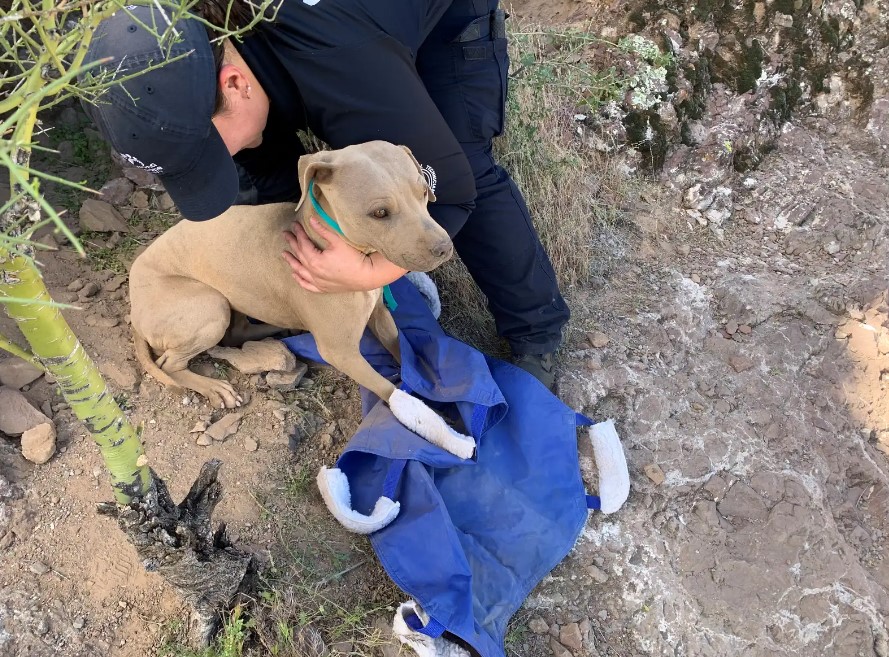
Since Bright Eyes was too exhausted to walk, her rescuers took turns carrying her down the mountain.
The lovely pup enjoyed being in their arms. She felt safe and relaxed.
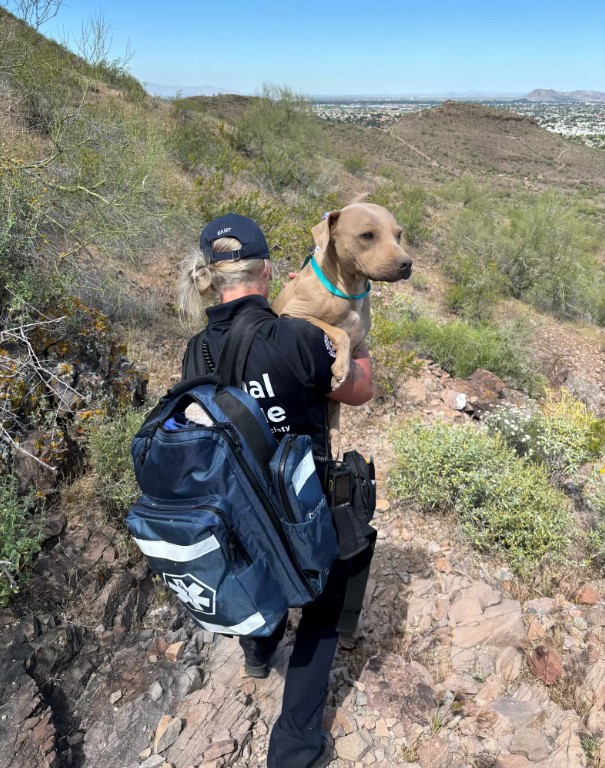
The hopelessness and sorrow disappeared from her eyes. They were now filled with gratitude toward the kind humans who rushed to her aid.
The pup knew that she was finally getting the help that she needed.
The Sweet Dog Gets The Help She Needed
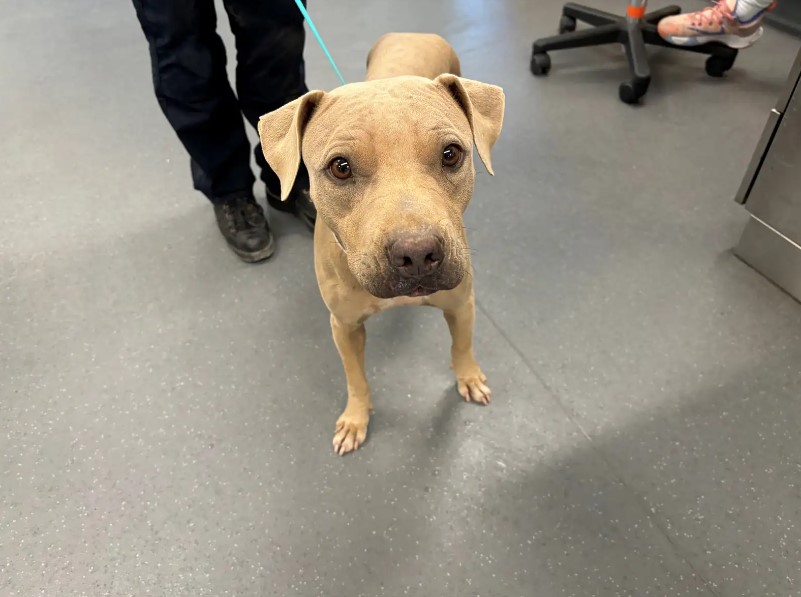
Nobody knows how Bright Eyes found herself on the mountain.
Her rescuers are thrilled because she was found in time.
“We were so elated to be able to get her. She was just so dehydrated. I think she’d probably been up there several days and that was probably her last day, and this Good Samaritan really just saved her life,” Jesus added.
Bright Eyes was taken to a hospital where she received medicine, fluids, and antibiotics. She was also given treatment for her stomach issues.
The pooch was estimated to be two years old.
As soon as she makes a full recovery, the beautiful Arizona girl will start looking for her forever home.
The wonderful pup hopes to find loving parents and start a brand-new life with them.
Thank you to both the kind-hearted Good Samaritan and the amazing animal medical technicians, Miiller and Jesus, for saving the life of this sweet girl.
If you’ve ever noticed your furry friend gnawing at their paws, you’re not alone. It’s a common sight that can leave you wondering what’s going on in their world. Dogs, with their playful antics and quirky behaviors, often have us scratching our heads in confusion. Chewing their feet is one such puzzling habit that many pet parents encounter.
As a seasoned dog trainer, I’ve witnessed this behavior in countless pups, each with their unique reasons behind it. Understanding why dogs engage in this foot-focused activity can shed light on their well-being and help us provide the care and attention they need. So, let’s take a closer look at this curious canine behavior and unravel the mystery behind why our four-legged companions can’t seem to keep their paws out of their mouths.
Understanding Canine Behavior
Reasons Dogs Focus on Their Feet
Dogs may focus on their feet due to various reasons that can be indicative of underlying issues. Here are some possible explanations for this behavior:
- Itchy Skin: Your dog might chew on their feet to alleviate itchiness caused by skin irritation from allergies, parasites, or other skin conditions.
- Pain or Discomfort: Dogs may chew their feet if they are in pain or discomfort, which could result from injuries, infections, or orthopedic problems.
- Boredom or Anxiety: Just like humans, dogs can exhibit self-soothing behaviors when bored or anxious, and focusing on their feet could be a way to cope.
- Grooming Instinct: Dogs have a natural grooming instinct, and excessive licking or chewing on their feet could be a part of this behavior.
- Foreign Objects: Sometimes, dogs may chew their feet to dislodge foreign objects like thorns or stickers that may have become embedded in their paws.
Understanding why your dog is fixating on their feet can help you address any potential issues promptly and ensure their well-being.
Common Causes of Foot Chewing in Dogs
Allergies as a Primary Culprit
Your dog might be chewing their feet due to allergies. Just like in humans, dogs can also have allergic reactions to various substances in their environment or food. These allergies can cause skin irritation, leading your furry friend to seek relief by chewing on their paws.
Parasites Prompting Itchy Paws
Parasites like fleas or mites can infest your dog’s paws, causing intense itching. In response, your dog may chew on their feet to alleviate the discomfort. Regular preventive measures and proper parasite control can help keep your dog’s paws parasite-free.
Anxiety and Stress-Related Behavior
Anxiety or stress can manifest in dogs through behaviors like excessive foot chewing. If your dog is feeling anxious or stressed, they may resort to this habit as a coping mechanism. Creating a safe and calm environment for your dog can help reduce their stress levels.
Skin Infections and Hot Spots
Skin infections or hot spots can also be a reason why your dog is chewing on their feet. These conditions can cause skin irritation and itchiness, prompting your dog to focus on their paws. Consulting a veterinarian for proper diagnosis and treatment is essential in these cases.
Environmental Irritants
Your dog’s paws may be reacting to irritants in their surroundings, such as cleaning products, pollen, or certain materials. Contact with these irritants can lead to itching and discomfort, prompting your dog to chew on their feet. Ensuring a clean and safe environment for your pup can help minimize exposure to potential irritants.
When Foot Chewing Is a Sign of Bigger Issues
Pain and Discomfort
If your dog is constantly chewing on their feet, it could potentially signify pain or discomfort. This behavior might indicate underlying issues like injuries, sprains, or fractures that cause your furry friend distress. Regularly check your dog’s paws for any signs of injury or sensitivity to ensure their well-being.
Behavioral Disorders
In some cases, excessive foot chewing may be linked to behavioral disorders in dogs. Conditions such as anxiety, obsessive-compulsive disorder, or stress can manifest through this behavior. Understanding the root cause of your dog’s anxiety can help address this issue effectively. Consulting a professional can provide insights on managing behavioral problems in your pet.
Treating and Preventing Foot Chewing
Veterinary Solutions for Allergies and Parasites
If your dog’s foot chewing is due to allergies or parasites, it’s crucial to consult your veterinarian for appropriate treatment. Allergies can cause skin irritation and itching, leading to excessive paw licking and chewing. Your vet may recommend allergy testing or prescribe medication to alleviate symptoms and prevent further discomfort. Additionally, parasites like mites or fleas can irritate your dog’s paws, causing them to chew. Your vet can offer solutions such as anti-parasitic treatments to address the underlying issue.
Stress Reduction Techniques
Stress and anxiety can trigger foot chewing in dogs. To help your furry companion manage stress, incorporate relaxation techniques into their routine. Regular exercise, interactive playtime, and creating a safe, comfortable environment can reduce anxiety levels. Providing your dog with engaging toys and positive reinforcement training can also help redirect their focus from chewing their feet. If stress persists, consider consulting a professional dog trainer or behaviorist for tailored strategies to support your pet’s well-being.
Importance of Paw Care and Hygiene
Maintaining proper paw care and hygiene is essential in preventing foot chewing. Regularly inspect your dog’s paws for any signs of injury, irritation, or foreign objects. Clean their paws gently after walks to remove dirt and debris that may cause discomfort. Keep their nails trimmed to prevent overgrowth, which can lead to paw sensitivity and chewing. Investing in paw balms or moisturizers can help keep their paw pads healthy and reduce the likelihood of excessive chewing. Prioritize your dog’s paw health to keep them comfortable and happy.
Recognizing When to Seek Professional Help
Identifying Abnormal Behaviors
If your dog’s foot chewing becomes excessive or is accompanied by other concerning behaviors like limping, redness, swelling, or sores on the feet, it’s time to seek professional help. These abnormal behaviors could indicate underlying medical conditions that need veterinary attention.
The Role of Veterinarians and Behaviorists
Veterinarians and behaviorists play crucial roles in diagnosing and managing your dog’s foot chewing issues. A vet can conduct thorough examinations, recommend appropriate tests for allergies or parasites, and prescribe medications or treatments to address the root cause of the behavior. Behaviorists can provide valuable insights into behavioral issues, offering training strategies to modify your dog’s chewing behavior effectively. Don’t hesitate to consult these professionals for tailored guidance in keeping your furry friend healthy and happy.
Conclusion
Understanding why dogs chew their feet is crucial for their well-being. From itchiness and pain to allergies and anxiety, various factors can contribute to this behavior. Consulting a veterinarian is key for identifying underlying issues like allergies or parasites. Treatment options, including allergy testing and medication, can help manage foot chewing. Stress reduction techniques and regular paw care are effective in addressing anxiety-related chewing. Remember, excessive foot chewing or abnormal behaviors warrant professional evaluation. Veterinarians and behaviorists play a vital role in diagnosing and treating these issues to ensure your furry friend stays healthy and happy.
Frequently Asked Questions
Why do dogs chew on their paws?
Dogs may chew on their paws due to itchiness, pain, boredom, grooming instinct, foreign objects, allergies, parasites, anxiety, skin infections, or environmental irritants.
When should I consult a veterinarian for my dog’s paw chewing?
Consult a vet if the paw chewing is excessive or accompanied by abnormal behaviors like limping, redness, swelling, or sores on the feet, especially if caused by allergies or parasites.
What are the suggested treatments for paw chewing in dogs?
Treatments may include allergy testing, medication for allergies or infections, anti-parasitic solutions, stress reduction techniques, and paw care maintenance.
How can I manage anxiety-related paw chewing in my dog?
Manage anxiety-related paw chewing by reducing stress, providing mental stimulation, exercise, and engaging activities, along with consulting a veterinarian for guidance.
Why is professional help important for excessive paw chewing in dogs?
Veterinarians and behaviorists play a crucial role in diagnosing and managing paw chewing issues through examinations, tests, medications, and training strategies for overall pet well-being.
[no_toc]

Hey there, I’m Janet Brooks, a dog-loving student from California. I’m all about helping pups in need, especially those without homes. Me and my awesome friends work together to give shelter and love to stray dogs. Oh, and I also write blogs about dogs to share helpful info.